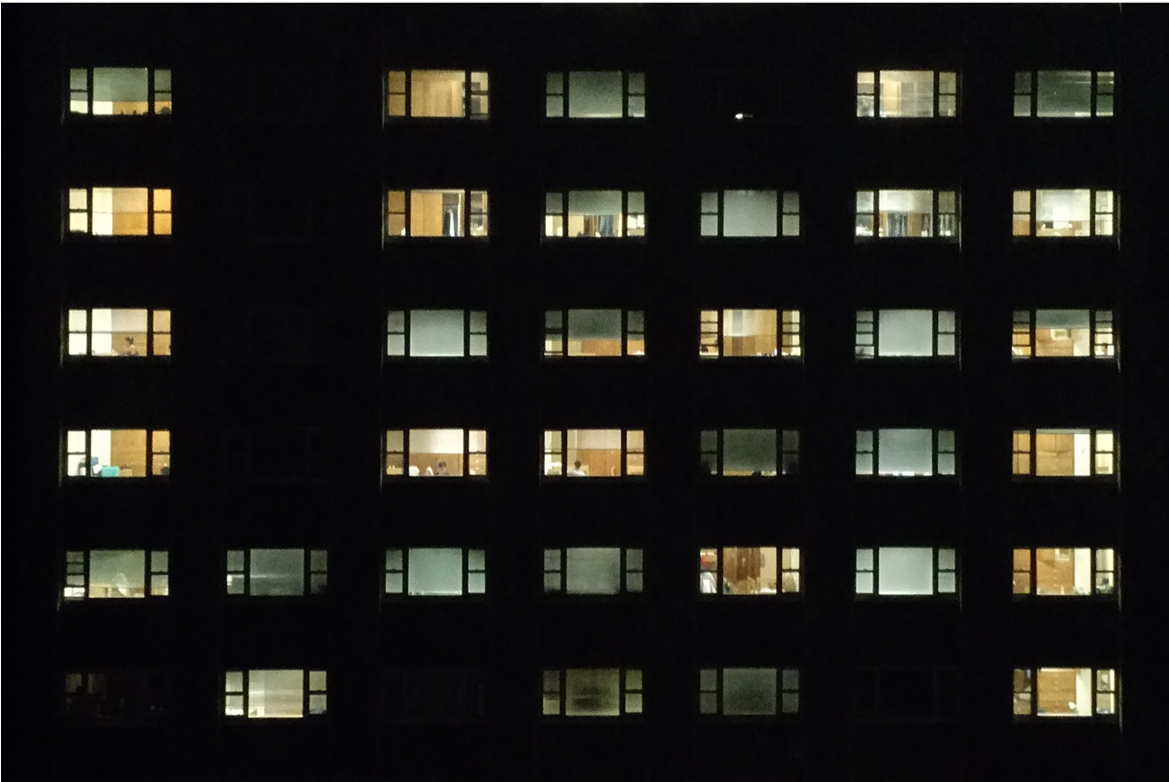issue 05: good night
letter from the editor

Night view across the street (Manhattan, 2016). Courtesy Unyimeabasi Udoh.
“Dreams are what keep you from falling asleep,” an inspirational slideshow recently informed Casey.1 That is to say: when you have a goal, sleep becomes secondary. Such dreams have recently disturbed their nights. They struggle to convince themself to set aside the day, their head too crowded with ideas and plans and notes and footnotes to those notes.
Writers and artists are often expected to work around the clock as proof that our lifestyle is not the easy or lazy choice. In exchange for living the dream, we are cursed to pull ourselves back to work even during the deepest slumber.
Now that Casey doesn’t sleep too well, their mornings stretch into their afternoons, further pushing their nights into their mornings. Maybe this was always going to be their fate: Their writing itself was tinged with the desire to delay saying good night, see you tomorrow, to anything ever, long before their nights were. Meanwhile, like the sun, Unyimeabasi has been going to bed early and rising late.2
The act of sleep is universal to each living human, but the ways in which we fulfill or break that contract with our body—and in which our body fulfills or breaks that contract with us—differ not only from individual to individual, but from one night to another. In Plates Issue 05: Good Night, each contributor offers a window on their distinct journey in sleep and sleeplessness.
The perspectives of each contributor sometimes conflict, but often resonate with each other, and occasionally do both in the same breath. Sleep unravels itself across the issue as a question of labour; of wellness; of vulnerability; as something to desperately crawl towards; as a connection to something larger than ourselves; and as something to do later, when we’re old.
The issue opens with Martha Ormiston’s ekphrastic text “Spiritco,” in which a protagonist searches for the meaning of a dream in an octogenarian spiritualist’s personal website. Later, Jason Lipeles crafts a “loving dream”3 out of grief and prayer in the page-based installation “shema (after k).” Jen Torwudzo-Stroh’s vignette “Nightwatch as Moon” offers a different mourning—for the impermanence of youth, played out under the Moon’s watchful eye.
Biyun Feng’s essay “Make a pillow of one’s spear waiting for daybreak” offers an in-depth exploration of the pillow form in order to better understand the intangible and daily ways in which object, body, and space collide throughout history. Also springing from the sociopolitics of sleeplessness, Evan Fusco’s semi-autobiographical lyric essay “I walk with her, and I hear the gentle beating of mighty wings…” forms personal and plural connections between death, dream, illness, and labour.
“Undemonised,” Fabiola Tosi’s interview with artist Gericault De La Rose, offers insights into De La Rose’s performance piece Sleeping Aswang (2021), which reflects on sleep as a form of vulnerability that complicates traditionally demonised identities. The issue closes with the poem, “Sleeping while awake,” in which Joan Roach writes of sleep through the lens of the disassociation they experienced while living alone after living with a partner for two pandemic-years.
While Casey is away, and while the shipping ban between the United States and New Zealand remains in effect,4 Plates Journal will be taking a small nap after this issue. We will use this moment of rest to consider how we can continue to shape the journal to achieve its dreams and support the dreams of its community.
Until then, xoxo your local midnight snacks,
Casey Carsel and Unyimeabasi Udoh
1 “World Students Day 2021,” YouTube, accessed 29 November 2021.
2 6:15am on weekdays; sometimes as late as 6:45am. This isn't meant to be a flex (promise!), just a sign that the two of us live on very different schedules—though now that there’s a time difference of eight hours between us, we find that we’re often awake together.
3 In Jason’s own words.
4 Melanie Carroll, “Covid-19: USPS stops NZ mail service due to 'unavailability of transportation',” Stuff, 2 October 2021.
